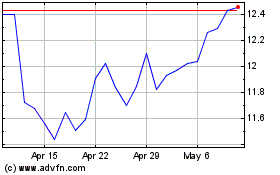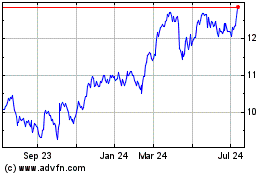Pair of large asset managers won't let investors withdraw as the
pound sinks
By Darren Lazarus, Jason Douglas and Jenny Strasburg
LONDON -- Two big British asset managers blocked worried
investors from pulling money out of real-estate funds, and the
pound sank to a new 31-year low Tuesday, twin signs that the U.K.'s
vote to leave the EU was injecting new turbulence into financial
markets after days of relative calm.
At the same time, the Bank of England eased regulatory
restraints on British banks, a bid to allow them to lend more and
keep the economy flush with credit.
Britain is laboring through the second week after its Brexit
vote with little clear direction. David Cameron has announced his
resignation as prime minister, his Conservative Party is picking a
successor in a sharply contested ballot and the opposition Labour
Party is in disarray.
Much of the postvote economic response has been left to the
central bank and its governor, Mark Carney. A news conference
Tuesday was Mr. Carney's third public appearance in the 12 days
since the vote.
The fund freeze is among the most tangible economic consequence
to sprout up. Investors, concerned that Britain's huge and frothy
real-estate market might come undone, scrambled to dump their
holdings. Fund managers, unable or unwilling to sell the shopping
malls and office buildings in their portfolios, closed the
door.
M&G Investments and Aviva Investors both said Tuesday they
had barred investors from pulling out of property funds, following
a similar announcement by Standard Life on Monday afternoon.
The real-estate fears and the pound's decline are intertwined:
Foreign investors have been huge buyers of U.K. property, and they
have started to cash out. The Bank of England said Tuesday in its
financial-stability report that foreign flows into U.K. commercial
real-estate sank nearly 50% in the first quarter. Late Tuesday in
London, the pound traded near $1.30, down 2%.
The central bank also pointed to signs in the stock market --
the midcap FTSE 250 index fell 2.4% Tuesday -- that foreign
investors were pulling out of the U.K. The economy faces a
"material slowing" in growth in the months ahead, officials warned
in the report.
Stocks fell broadly in Europe Tuesday. The only index that ended
the day in positive territory was Britain's FTSE 100, which is
packed with companies with foreign earnings and is boosted by the
weak pound.
Investors fled to government bonds: Yields on the 10-year U.S.
Treasury bond and the 10-year U.K. gilt touched record lows. Yields
fall as prices rise.
Souring views on the global economy, and views that low
inflation will persist, have helped pull down long-term bond yields
across the developed world. Short-term bond yields have also
declined, reflecting a belief that central banks will keep rates at
ultralow levels, or possibly even cut them further. But the slump
in long-term yields is especially dramatic. In the U.K., the
10-year bond now yields around two-thirds of a percentage point
more than the two-year bond, roughly half the spread that existed
at the beginning of the year.
The BOE's move Tuesday to reduce the so-called countercyclical
capital buffer from 0.5% to zero is one of the first instances of a
major central bank relaxing bank-capital requirements to mitigate a
gathering economic slowdown.
The change means banks don't need to hold as much capital
against their assets. The BOE said they aren't supposed to use the
breathing room to increase dividends or other payouts.
It is an especially important test case because traditional
central-bank tools are stretched. The BOE's benchmark interest rate
is 0.5%, meaning Mr. Carney doesn't have much room to cut rates
further. The bank may be led to cut nonetheless and to revive its
bond-buying program.
Real estate is an especially vulnerable asset to mass flight
because it is difficult to sell quickly, while "open-ended" funds
typically allow their investors to cash out any day they like.
"Systemic risk would arise from the funds needing to sell
illiquid assets in a hurry," said Michael Snapes, a
financial-services risk and regulation director with
PricewaterhouseCoopers in London. That would depress prices
further, spurring more redemption requests and a downward
spiral.
M&G said it put up the gate on a GBP4.4 billion U.K.
property fund -- the biggest of its kind -- after redemption
requests rose on the back of "high levels of uncertainty."
Aviva said in a note to investors that dealing in the GBP1.8
billion Aviva Investors Property Trust was "temporarily suspended"
at midday on July 4 because of "higher than usual volumes of
requests to sell units." Standard Life locked investors into its
GBP2.9 billion UK Real Estate Fund.
"It would not surprise me if similar firms take similar actions
in the coming weeks," said Laith Khalaf, senior analyst at
Hargreaves Lansdown.
The U.K. commercial real-estate market holds in aggregate about
GBP800 billion worth of assets, according to Mike Prew, an analyst
at Jefferies Group LLC. Residential real-estate assets amount to a
total of GBP5 trillion.
Memories of the global financial crisis of 2008, when problems
in the housing sector quickly spread to banks, loom large for
investors.
Analysts said the U.K. banking system is now more insulated
against a commercial-property crash than it was then. Regulators
forced banks to raise capital and go through a series of stress
tests to check whether they can weather a severe downturn.
British banks have since cut their stock of commercial
real-estate lending in half, according to the Bank of England. Much
of that slack was taken up by the nonbanking sector: Pension funds
and insurers, looking for steady returns in a low-interest-rate
environment, piled in.
But while major banks like Lloyds Banking Group PLC and Royal
Bank of Scotland Group PLC cut their lending, smaller British banks
have jumped in. These newer lenders have taken on proportionately
more high-risk loans in the commercial sector.
Investors are already taking flight from smaller banks that have
been gaining share in the buy-to-let market, in which banks lend to
landlords. Some analysts expect rental-property lending to be stung
by Brexit if house prices fall, especially in London.
For instance, Aldermore Group PLC, a small lender which focuses
on small businesses, saw its share price drop 9% on Tuesday. It is
down 64% over the past 12 months.
A relatively small increase in write-offs of U.K. real-estate
exposures would be painful for Aldermore and a handful of other
small lenders with more-concentrated investment in the sector,
Deutsche Bank U.K. banking analyst David Lock wrote in a research
note last week.
Meanwhile, shares of Virgin Money Holdings PLC, another rapidly
growing bank, tanked 11% on Tuesday's news. In the first three
months of the year Virgin Money increased buy-to-let lending by 17%
compared with the year before.
--Max Colchester, Elizabeth Pfeuti, Andy Pearce and Mike Bird
contributed to this article.
Write to Jason Douglas at jason.douglas@wsj.com and Jenny
Strasburg at jenny.strasburg@wsj.com
(END) Dow Jones Newswires
July 06, 2016 02:48 ET (06:48 GMT)
Copyright (c) 2016 Dow Jones & Company, Inc.
Aviva (PK) (USOTC:AVVIY)
Historical Stock Chart
From Mar 2024 to Apr 2024

Aviva (PK) (USOTC:AVVIY)
Historical Stock Chart
From Apr 2023 to Apr 2024
